Yamaha Vs Honda Generators – [Who is The Winner?]
Yamaha Vs Honda Generators, which is more portable, fuel-efficient, reliable, quieter, and lightweight? Learn who is the winner in this article. We not only compare the brands, but we also compared top models from the respective brands.
As an expert in the field of generators, I have thoroughly evaluated and compared two Yamaha and Honda, based on various factors including price, noise, power output, reliability, weight and size, and durability.
When it comes to generators, Yamaha and Honda are renowned for their high-quality products designed for various applications such as RVs, camping, boondocking, home backup, and general outdoor activities.
The main differences between Yamaha and Honda generators are the price and noise level. Honda generators are slightly pricier but also quieter compared to Yamaha generators. However, both brands offer competitive features in terms of power output, reliability, durability, weight, portability, and warranty.
To understand which brand is best for which category, let’s compare the brands and their top models in detail.
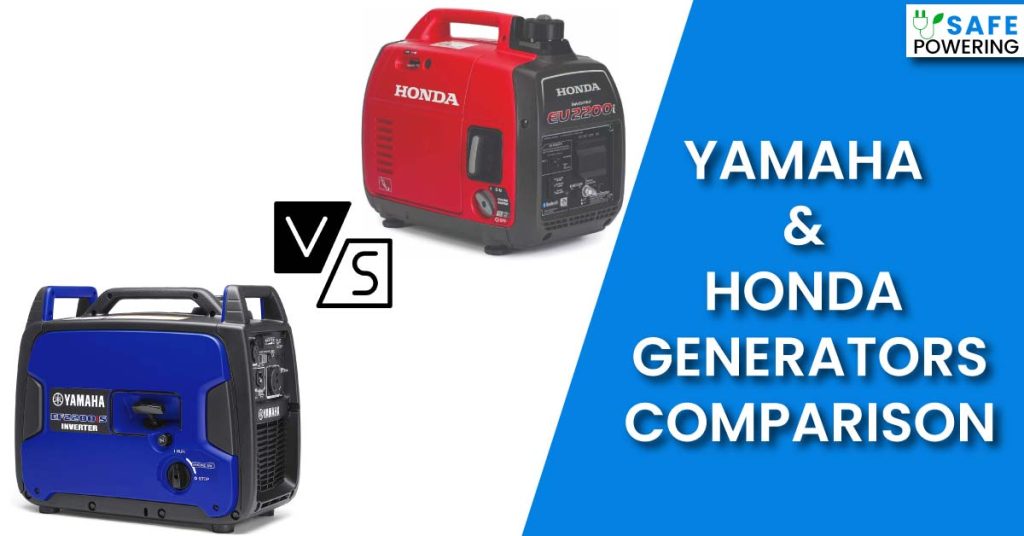
Yamaha Vs Honda Generators – Brands Comparison
Honda brand, a pioneer in the industry, began producing generators in 1973. They are known for producing clean power with very low harmonic distortion, making their generators ideal for powering sensitive appliances.
Some Honda generators can produce power as clean as utility line power.
With a wide range of options, Honda generators offer wattages from 1000 to 7000+, providing versatility for various power needs.
I have fond memories of my family’s Honda EG2200X generator, which accompanied us on camping and boondocking trips in the 90s and never failed us.
The name Honda has always been synonymous with durability and reliability, as their generators are engineered to withstand the test of time.
Similarly, the Yamaha brand has been in the generator manufacturing business since 1973, but it was their release of the Yamaha EF2000is 2000-watt generator in 2009 that propelled their popularity to new heights.
This lightweight inverter generator quickly became a preferred choice for RVs and campers due to its low noise levels and extended runtime.
Since then, Yamaha has continued to innovate, producing fuel-efficient, lightweight, and quiet generators suitable for both homes and camping.
They offer a wide range of generator models, from 2000 watts to 6000+ watts, catering to various power requirements, whether it’s for powering small camping appliances or running larger equipment like air conditioners.
In terms of reliability and durability, Yamaha stands as a worthy competitor to Honda.
Recommended Read: Honda and Champion Generators Comparison
Let’s get more into details:
Power:
Both Yamaha and Honda generators provide reliable performance.
Both generators offer a wide range of options, from smaller portable generators with lower power output suitable for camping and RVs, to larger generators with higher power output for home backup or heavy-duty use.
If I compare Honda EU2200i and Yamaha EF2200is which are top models from the respective brands, the following result I got from my load test:
- The Honda EU2200i generated 2190 peak watts and 1778 running watts.
- Yamaha EF2200is generated 2193 peak watts and 1782 running watts.
As you see, there is not much difference between the two.
Noise:
Both the Honda EU2200i and Yamaha EF2200is are well-known for their low noise levels. However, when it comes to comparing the two, Honda has a slight edge in terms of noise reduction.
The Honda EU2200i generates only 48dB of noise from 23.5 feet away, which is incredibly quiet. In contrast, the Yamaha EF2200is is rated at 56 to 57dB from the same distance, making it about 18 to 19% louder than the Honda.
Yamaha uses advanced noise block sound reduction systems in their latest models, which help to reduce noise levels significantly.
Based on my experience and expertise, Honda inverter generators are still a bit quieter than Yamaha. So, if you’re looking for the quietest generator possible, you may want to go with the Honda EU2200i.
Fuel-Efficiency:
So, I gathered two Honda generators and two Yamaha generators to test the fuel efficiency.
- Honda EU2200i: 8.2 hours @ 25% load (0.95-gal tank)
- Honda EU3000is 20 hours @ 25% load (3.4-gal tank)
- Yamaha EF2200is: 10.46 hours @ 25% load (1.24-gal tank)
- Yamaha EF3000ISEB: 18.6 hours @25% load (3-4-gal tank)
Yamaha EF2200is has a slight edge over Honda EU2200i but Yamaha’s fuel tank is significantly larger. However, Honda EU3000is beats Yamaha EF3000ISEB despite having the same fuel-tank size.
Reliability:
When it comes to reliability, both Yamaha and Honda generators have a solid reputation for being dependable and long-lasting.
They are equipped with advanced technologies to ensure stable power output, clean energy, and protection against overloads and other electrical issues.
Durability:
Durability is another important factor to consider in generators, and both Yamaha and Honda excel in this aspect.
They are built with high-quality materials, robust construction, and weather-resistant features to withstand tough outdoor conditions and ensure durability over time.
Size and Weight:
Weight and size are crucial considerations for portable generators, and both Yamaha and Honda offer lightweight and compact options for easy transport and storage.
Yamaha generators are known for their innovative designs that prioritize portability, while Honda generators are also compact and lightweight, making them suitable for camping, RVs, and other outdoor activities.
Recommended Read: Honda and Generac Generators Comparison
Yamaha Vs Honda Generators – Model Comparison
In this section, we will compare two Honda generators with two Yamaha generators. let’s get into it.
Yamaha EF2200is Vs Honda EU2000i
| Specifications | HONDA EU2200i | Yamaha EF2200is |
| Image | 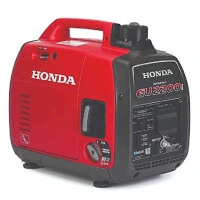 | 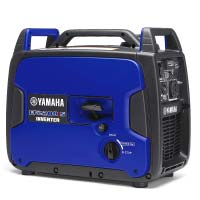 |
| Type | Inverter | Inverter |
| Peak watts | 2200 | 2200 |
| Running watts | 1800 | 1800 |
| Engine | OHV, 4-stroke, single cylinder. 121cc | OHV, 4-stroke, single cylinder. 79cc |
| Fuel tank | 0.95 gal | 1.24 gal |
| Noise | 57 from 23.5 feet away @ 25% load | 48 from 23.5 feet away @ 25% load |
| Runtime | 8.1 hours at 25% load | 10.45 hours at 25% load |
| Outlets | x2 120V AC 15A outlets, a battery charging DC 12V outlet | x2 120V AC 15A outlets, a battery charging DC 12V outlet |
| Starter | Manual recoil | Manual recoil |
| Weight | 47.4lbs. | 55.2lbs. |
| Dimensions | 20 x 11.4 x 16.7 inches | 21.9 x 18.8 x 18.5 inches |
| Warranty | 3-year warranty on all generators for both residential and commercial use | 3-year limited warranty |
| Eco-mode | Yes | Yes |
| CO SENSOR | Yes | No |
| Parallel connection | Yes | Yes |
| Price | Check Price | Check Price |
Both the Yamaha EF2200is and the Honda EU2200i generators produce 1800 running watts and 2000 surge watts.
The Honda generator has a 121cc engine, while the Yamaha has a smaller 79cc engine.
However, despite the larger engine, the Honda has a smaller fuel tank of 0.95 gallons, compared to Yamaha’s 1.21-gallon fuel tank.
The Honda generator is more fuel-efficient, but the Yamaha has a longer runtime of 10.46 hours at 25% load compared to Honda’s 8.2 hours.
In terms of noise, the Honda generator is quieter, generating only 48dB from 23.5 feet away, compared to Yamaha’s 56 to 57 dB.
When it comes to maintenance, both generators are easy to maintain, with Honda requiring combustion chamber cleaning after 300 hours of usage and Yamaha only needing the head to be cleaned once per year.
For outdoor activities, every ounce of weight counts, and the Honda generator is a few pounds lighter than the Yamaha.
The Yamaha generator is only slightly cheaper than the Honda, so the decision comes down to personal preference. If you prioritize reduced noise and weight, the Honda EU2200i is the better option. If you want a longer running time, then the Yamaha EF2200is is the better choice.
Recommended Read: Comparison of Honda and Wen Generators.
Honda EU3000is Vs Yamaha EF3000ISEB
| Specifications | HONDA EU3000is | Yamaha EF3000iSEB |
| Image | 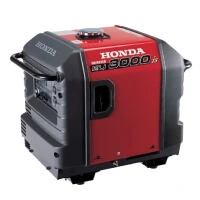 | 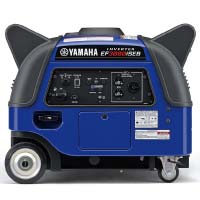 |
| Type | Inverter | Inverter |
| Peak watts | 3000 | 3000 (+5000 boost) |
| Running watts | 2800 | 2800 |
| Engine | OHV, 4-stroke, single cylinder. 196cc | OHV, 4-stroke, single cylinder. 171cc |
| Fuel tank | 3.4 gal | 3.4 gal |
| Noise | 53 to 54dB from 23.5 feet away on ECO mode | 55 to 57 100% load from 30 feet away |
| Runtime | 20 hours at 25% load | 18.6 hours at 25% load |
| Outlets | 12V DC, 20A and 30A 120V AC, 30A Twist lock | X2 120V 20A (5-20R), 120V 30A (TT-30R). USB |
| Starter | Manual recoil, electric | Manual recoil |
| Weight | 130.7lbs. | 154.6lbs. |
| Dimensions | 25.9 x 17.6 x22 inches | 26.5 x 17.8 x 21.9 inches |
| Warranty | 3-year warranty on all generators for both residential and commercial use | 3-year limited warranty |
| Eco mode | Yes | Yes |
| CO SENSOR | Yes | No |
| Parallel connection | Yes | Yes |
| Price | Check Price | Check Price |
Both Yamaha EF300iSEB and Honda EU3000is can produce 3000 surge watts and 2800 running watts.
However, during load tests, it was found that EU3000is can produce slightly lower running watts, getting as close as 2750 whereas Yamaha can produce up to 2755 running watts.
When it comes to noise levels, Honda EU3000is performs better, producing only 53 to 54dB from 23.5 feet away on ECO mode, while Yamaha is rated at 55 to 57dB at 100% load from 30 feet away based on noise tests.
EU3000is has a 196cc engine, whereas Yamaha EF300iSEB has a smaller 149cc engine. Despite the difference in engine size, both generators have 3.4-gallon fuel tanks.
In terms of fuel efficiency, EF300iSEB can run up to 18.7 hours at 25% load, while EU3000is can run up to 20 hours at the same load. Honda is known for producing highly fuel-efficient generators.
EU3000is weighs 130.6 pounds, while Yamaha weighs 154.3 pounds. Although both generators are not lightweight and portable, Honda is the more compact and portable of the two.
When it comes to price, Yamaha EF300iSEB is around $780 to $800 cheaper than Honda EU3000is.
It comes down to the price. Yamaha EF3000ISEB is $700 to $800 cheaper than Honda EU3000i.
Recommended Read: Honda vs Predator Generators
Honda vs Yamaha Generators – Who is the Winner?
As a user of both Yamaha and Honda generators, I believe both are great choices. Honda has better noise control and is more compact but is pricier as it’s considered the market leader.
Yamaha requires less maintenance and has similar power and durability. Both have good runtime, making them perfect for camping.
It’s up to personal preference and budget, but in my opinion, Honda is the winner.
Frequently Asked Questions (FAQs)
What Is the Difference Between Yamaha and Honda Generators?
Both Yamaha and Honda generators are reliable, durable, and powerful. The main difference is the price gap. Honda is pricier than Yamaha. However, Yamaha generators require less maintenance and are often less expensive, while Honda generators offer better noise control and a more compact design.
Which Generator Brand Is More Reliable?
Both Yamaha and Honda generators are known for their reliability. However, Honda generators are often considered the gold standard in the market due to their excellent performance and customer service.
Which Generator Brand Has a Longer Runtime?
Both Yamaha and Honda generators are known for their reliability. However, Honda generators are often considered the gold standard in the market due to their excellent performance and customer service.
Which Generator Brand Has a Longer Runtime?
Both Yamaha and Honda generators have excellent runtime and can provide power for several hours. The exact runtime will depend on the model and the load being used.
Are Yamaha or Honda Generators Better for Camping?
Both Yamaha and Honda generators are great options for camping trips. They are both portable, reliable, and offer good runtime. However, Honda generators may be a better choice if noise control is a concern, as they are known for their quiet operation.
Is It Worth Paying More for a Honda Generator?u003c/strongu003e
It depends on your needs and budget. While Honda generators may be more expensive, they offer excellent noise control and a more compact design.

Fareed, the highly skilled electrical expert, boasts 5 years of extensive experience in proficiently maintaining, repairing, diagnosing, and installing a diverse range of electrical systems.
